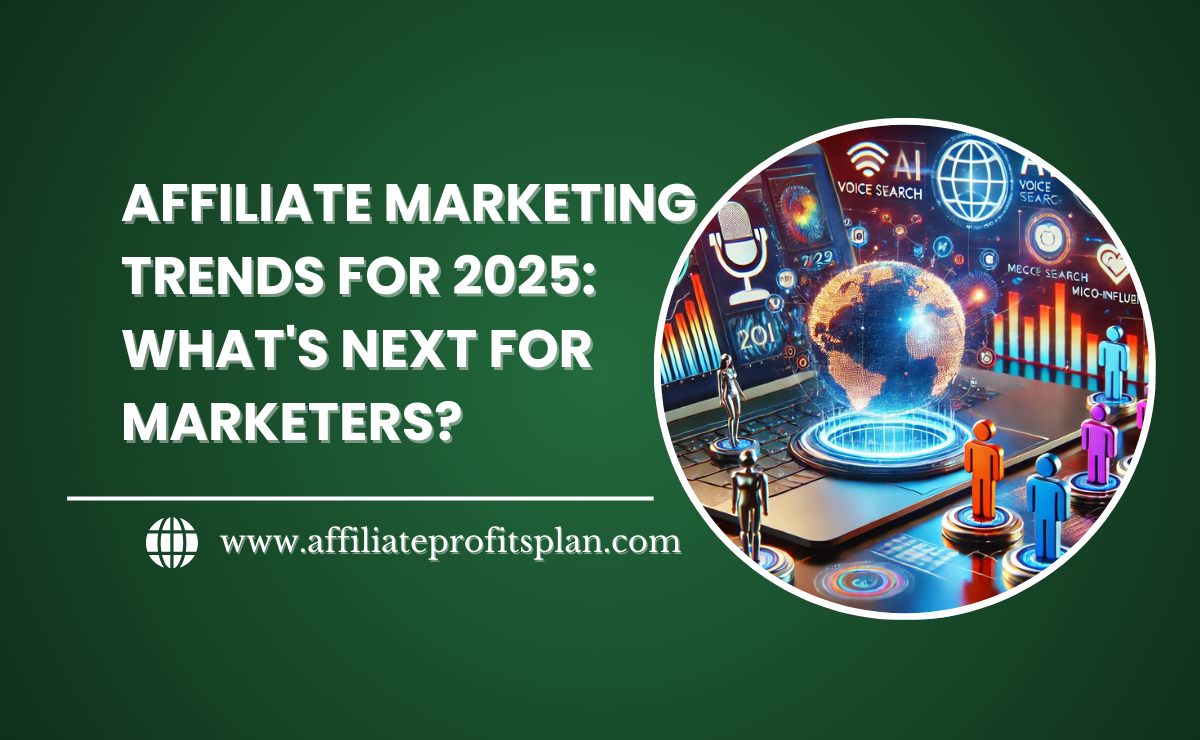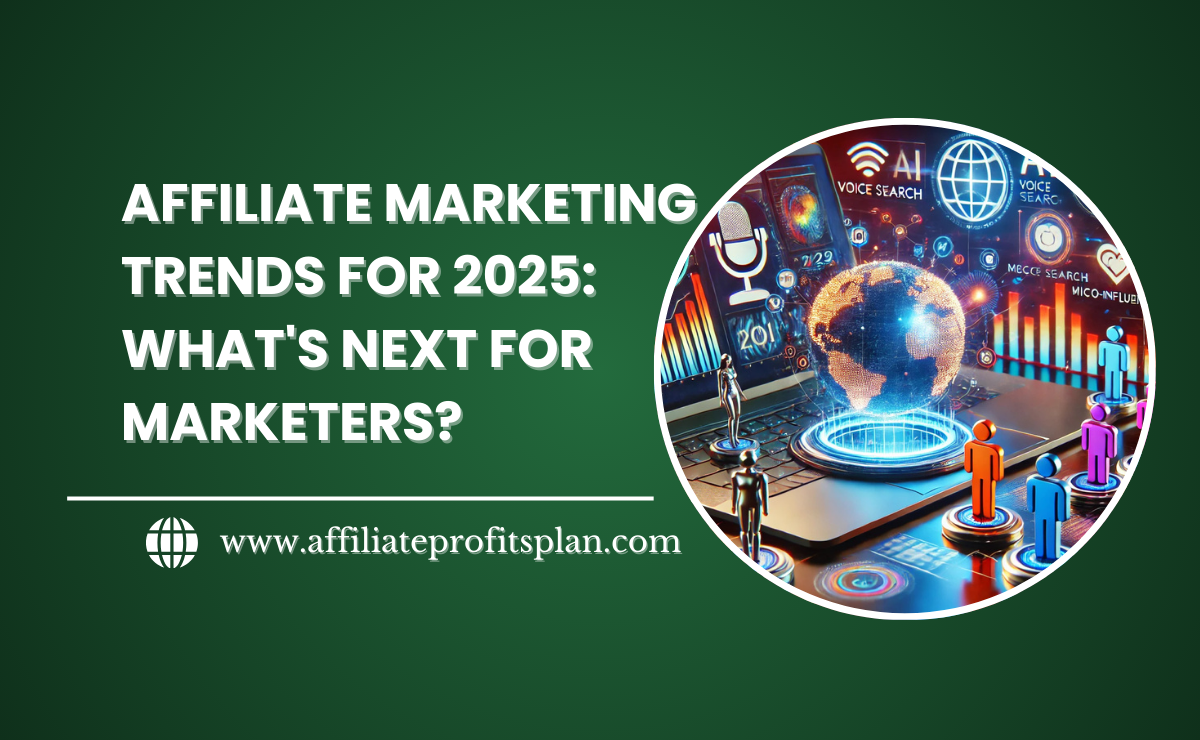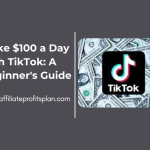Welcome to my article “Affiliate Marketing Trends for 2025: What’s Next for Marketers?” Affiliate marketing has always been a bit like the Wild West—full of opportunity, but constantly changing. Just when you think you’ve mastered the game, a shiny new trend or algorithm update rides into town, turning your tried-and-true strategies into yesterday’s news. If you’re feeling like keeping up is half the battle, don’t worry—you’re not alone. The good news? 2025 is shaping up to be a year of exciting developments that could turbocharge your affiliate marketing efforts (assuming you don’t ignore them, of course).
From AI and automation to influencer marketing taking a quirky new twist (hello, micro-influencers), the affiliate world is evolving faster than ever. And let’s not forget voice search—because apparently, everyone prefers talking to their devices over typing these days. Throw in some stricter privacy laws and the emergence of fresh niches like crypto and eco-friendly products, and you’ve got a recipe for a fascinating year ahead.
But don’t panic just yet. We’re here to break it all down for you—what’s hot, what’s next, and how you can ride the wave of change rather than getting swept under it. So grab your favorite coffee (or tea, no judgment), and let’s dive into the top trends shaping affiliate marketing in 2025. Because staying ahead of the curve doesn’t just make you smarter—it also makes you richer. And who doesn’t want that?
Access Our Proven Tested Formula for $50-$100 Daily Income – Watch This FREE Video >>

The Role of AI and Automation in Affiliate Marketing
If affiliate marketing were a superhero movie, AI and automation would be the tech-savvy sidekick that makes everything way cooler. These tools aren’t here to replace marketers (no, robots won’t be taking over your affiliate commissions just yet), but they’re definitely here to do the heavy lifting so you can focus on the fun stuff—like dreaming up new strategies or finally binge-watching that Netflix show you’ve been putting off.
AI is changing the game in more ways than one. Imagine having a tool that can analyze your audience’s behavior faster than you can refresh your Instagram feed. AI-powered analytics tools are taking the guesswork out of affiliate marketing by delivering insights on what your audience wants, when they want it, and where they’re most likely to click “Buy Now.” No more guessing which products will resonate—AI knows, and it’s always one step ahead.
Then there’s automation, the unsung hero of scaling your affiliate empire. Automation tools can handle repetitive tasks like email marketing, campaign optimization, and even social media posting. Instead of manually A/B testing your landing pages for weeks, automation can do it in hours and show you the clear winner. Think of it as your marketing autopilot—it keeps things running smoothly while you focus on the bigger picture.
And let’s not forget AI-generated content. From blog posts to ad copy, AI tools are becoming eerily good at creating engaging, SEO-friendly content (though we’d recommend a final human touch to keep things authentic). Pair this with automated tracking and reporting tools, and you’ve got a streamlined operation that runs like a well-oiled machine.
In 2025, using AI and automation won’t just be a “nice to have”—it’ll be the secret sauce to staying competitive. So, whether you’re a one-person show or running a full-blown affiliate team, it’s time to embrace your tech-savvy sidekick. Because if you don’t, your competitors definitely will.
Influencer Marketing and the Rise of Micro-Influencers
Remember when influencer marketing was all about celebrities with millions of followers convincing you to buy overpriced skincare? Well, times have changed. Welcome to the age of micro-influencers, where less is actually more—at least when it comes to follower counts. These niche-focused creators may not have millions of fans, but they’ve got something even better: trust. And in the world of affiliate marketing, trust converts.
Micro-influencers are the relatable neighbors of social media. They’re the ones sharing makeup tutorials from their kitchen or fitness tips from their garage gym. Their audiences aren’t just numbers—they’re loyal fans who hang on to every recommendation like it’s gold. And when a micro-influencer says, “This product changed my life,” their followers actually believe them. It’s no wonder brands are ditching celebrity endorsements for these smaller-scale creators who bring in big results.
Here’s the kicker: micro-influencers are more affordable, too. You don’t need a six-figure budget to partner with them. Many work on performance-based deals, earning commissions through affiliate links. This makes them the perfect match for affiliate marketing, where everyone benefits from those sweet, sweet conversions. Plus, they’re masters of creating authentic content that doesn’t scream “AD!”—because nothing kills the vibe faster than an overly polished pitch.
And let’s talk platforms. Instagram and TikTok continue to dominate the influencer marketing space, but even Pinterest and YouTube are proving to be goldmines for micro-influencers. These platforms make it easier than ever for creators to integrate affiliate links, whether through shoppable posts, product tags, or clever video tutorials. Combine that with their knack for engaging their niche communities, and you’ve got a recipe for affiliate marketing success.
In 2025, micro-influencers aren’t just a trend—they’re a strategy. Whether you’re selling eco-friendly beauty products or the latest tech gadgets, teaming up with these relatable creators could be the smartest move you make. Because when it comes to building trust and driving sales, smaller circles can have the biggest impact.
Voice Search and the Impact on Affiliate Marketing
“Hey Alexa, what’s the best product for glowing skin?” If that sentence doesn’t make you rethink your affiliate marketing strategy, it should. Voice search is no longer a futuristic gimmick—it’s how millions of people are shopping, researching, and making decisions. And if your content isn’t optimized for it, you might as well be whispering into the void.
Here’s the deal: voice search is all about convenience. People love asking their smart devices quick, conversational questions while cooking dinner, driving, or binge-watching their favorite show. It’s fast, hands-free, and doesn’t require typing (because let’s face it, who wants to type anything when they can just talk?). But this shift in search behavior means you need to rethink your approach to affiliate marketing.
For starters, voice search relies heavily on long-tail keywords and natural language. Instead of “best headphones 2025,” people are asking, “What are the best noise-canceling headphones for working from home?” That’s your cue to create content that answers specific, conversational queries. Think “Top 5 Products for Remote Workers in 2025” or “The Ultimate Guide to Noise-Canceling Headphones.” These are the kinds of answers smart devices love to serve up—and where your affiliate links can shine.
But it’s not just about keywords. Voice search also prioritizes quick, actionable answers. This is where featured snippets (aka the coveted “position zero” on Google) come into play. Structuring your content with concise summaries, bullet points, and Q&A sections increases your chances of landing there. And trust us, if your affiliate content gets picked as a voice search result, the clicks (and commissions) will follow.
Oh, and let’s not forget local search. With voice assistants increasingly used to find nearby services and products, adding location-based keywords to your affiliate strategy can help you tap into local audiences. Think “best eco-friendly stores near me” or “top fitness gadgets in New York.”
In 2025, voice search isn’t just a nice-to-have feature—it’s a game-changer. Adapting your affiliate marketing strategy to this hands-free trend could be the difference between staying relevant and getting left behind. So, go ahead, optimize for those questions people are asking out loud. Because the future of affiliate marketing might just be one “Hey Siri” away.
Privacy Regulations and Data-Driven Marketing
Remember the good old days when marketers could track users across the internet like a digital Sherlock Holmes? Well, those days are officially over. Thanks to evolving privacy regulations, like GDPR and CCPA, the Wild West of data collection has been tamed, and marketers are now operating in a world where “consent” isn’t just a polite formality—it’s the law. But don’t worry; while the rules are tightening, data-driven marketing isn’t dead. It’s just getting smarter (and maybe a little more ethical).
Access Our Proven Tested Formula for $50-$100 Daily Income – Watch This FREE Video >>
Privacy regulations are reshaping how marketers collect and use consumer data. Gone are the days of sneaky cookie tracking and third-party data free-for-alls. Today, it’s all about transparency and putting users in control. This means you’ll need to level up your consent game with clear cookie policies, opt-ins, and the all-important unsubscribe button (yes, people will actually use it). But here’s the silver lining: playing by the rules builds trust, and trust is priceless in affiliate marketing.
So, how do you thrive in this brave new world? Enter first-party data. Instead of relying on third-party trackers, smart marketers are focusing on gathering data directly from their audience. Think email sign-ups, surveys, and loyalty programs. Sure, it’s more work, but the data is more accurate, more actionable, and—most importantly—completely yours. Plus, users are more likely to share information when they know you’re respecting their privacy.
And let’s not forget contextual targeting. With third-party cookies on their way out, marketers are turning to content-based strategies. This means delivering ads or affiliate recommendations based on the context of the page, not the user’s browsing history. For example, if someone’s reading a blog about sustainable living, your affiliate link for eco-friendly products fits right in—no tracking required.
In 2025, privacy regulations aren’t just a challenge; they’re an opportunity to refine your affiliate marketing strategy. By focusing on transparency, first-party data, and creative targeting, you’ll not only stay compliant—you’ll build a stronger, more loyal audience. Because when it comes to privacy, doing the right thing isn’t just good karma; it’s good business.
Emerging Niches and Affiliate Opportunities in 2025
If you thought the affiliate marketing gold rush was over, think again. 2025 is opening up a treasure chest of emerging niches that are ripe for affiliate opportunities—and the best part? You don’t need to fight over the same overcrowded markets anymore. Instead, you can carve out your spot in these growing industries and rake in commissions while they’re still on the rise. Let’s take a peek at where the affiliate magic is happening.
First up, the eco-conscious market. Sustainability isn’t just a buzzword anymore; it’s a lifestyle. From reusable gadgets to eco-friendly beauty products and even green tech like solar-powered chargers, consumers are flocking to brands that align with their values. Affiliates who tap into this niche can ride the wave of conscious consumerism with products that are as kind to the planet as they are to your commission check.
Then there’s the wellness revolution. Sure, health and fitness have always been hot, but 2025 is taking it up a notch with niches like mental health tools, at-home fitness tech, and personalized nutrition plans. Think apps that help you meditate, wearable tech that tracks more than just steps, and meal kits customized for your DNA. These aren’t just products—they’re lifestyles, and they offer endless affiliate opportunities for marketers who want to cater to health-conscious audiences.
And let’s not forget the rise of the creator economy. More people than ever are looking to turn their side hustles into full-time gigs, which means there’s a growing demand for tools like online courses, design software, and e-commerce platforms. If you can recommend products that help creators level up their businesses—whether it’s a top-tier video editing tool or a website builder—you’ll find yourself in a highly profitable niche.
But wait, there’s more. Emerging tech like AI-powered gadgets and Web3 tools are becoming increasingly mainstream. Products that make life smarter, easier, or more futuristic are always a hit, and if you can position yourself as an affiliate in this space, you’ll be ahead of the curve. The same goes for niches like virtual reality, cryptocurrency, and NFTs—they’re not just trends; they’re industries with staying power.
The key to thriving in these niches is to get in early. Research what’s trending, find the gaps in the market, and position yourself as an authority before the competition catches on. By tapping into these emerging opportunities, you won’t just grow your affiliate income—you’ll future-proof it. Because if 2025 has taught us anything, it’s that staying ahead of the curve is where the real money’s at.
Conclusion
Affiliate marketing in 2025 is shaping up to be an exciting, fast-paced rollercoaster ride—and yes, you’ll want to keep your seatbelt on. With AI, voice search, micro-influencers, privacy regulations, and emerging niches shaking up the game, there’s never been a better time to evolve your strategy and grab your slice of the affiliate pie. But here’s the kicker: success in this ever-changing landscape isn’t just about jumping on trends; it’s about staying adaptable, informed, and one step ahead.
Access Our Proven Tested Formula for $50-$100 Daily Income – Watch This FREE Video >>
Think of it this way: the affiliate marketing world is like a party where the DJ keeps changing the music. One minute, it’s influencer marketing with micro-influencers dropping beats; the next, it’s AI automating your dance moves, and suddenly, privacy regulations demand you politely ask to stay on the dance floor. Sure, it might feel like a lot to keep up with, but those who learn the rhythm will be the ones raking in the rewards.
If there’s one thing 2025 is making crystal clear, it’s that the old ways of doing affiliate marketing just won’t cut it anymore. To stay relevant, you’ll need to embrace technology, focus on authenticity, and be ready to pivot when new opportunities arise. Whether it’s leveraging AI to streamline your campaigns, partnering with relatable micro-influencers, or diving into untapped niches, the possibilities are endless for those willing to innovate.
So, what’s next for affiliate marketers? A world of opportunity. By staying curious, creative, and customer-focused, you’ll not only survive but thrive in this ever-evolving industry. Because at the end of the day, affiliate marketing isn’t just about commissions—it’s about building relationships, delivering value, and riding the wave of change with confidence. And hey, if you play your cards right, 2025 might just be your most profitable year yet.
Thanks a lot for reading my article on “Affiliate Marketing Trends for 2025: What’s Next for Marketers?” till the end. Hope you’ve helped. See you with another article.










